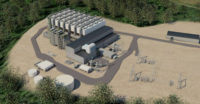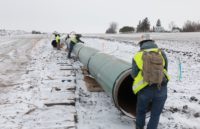The Minnesota Court of Appeals has upheld state regulators’ approval of a power company’s proposed $700-million natural gas power plant as being necessary and more reliable than renewable energy sources. The Aug. 23 ruling supporting construction of the estimated 525-MW Nemadji Trail Energy Center comes after a challenge from project opponents who said it would accelerate climate change impacts.
The three-judge panel said Minnesota Power and the state commerce agency “offered extensive evidence and analyses that ... transition to intermittent renewable resources impairs reliability” and could increase costs.
The plant is a joint venture between the company and Wisconsin-based Dairyland Power that is proposed to be built in Superior, Wis. It needed Minnesota regulatory approval because Minnesota Power wants to charge state ratepayers for its construction and operation
The plainitffs, which include the Minnesota Center for Environmental Advocacy, Sierra Club, and the Union of Concerned Scientists, termed the ruling “disappointing,” contending that no new fossil fuel plants should be built. They point to Minnesota Power’s own plan to be carbon free by 2050 as evidence of the need to address climate change issues.
“This decision may have upheld Minnesota Power’s financial agreements, but it does not show that a $700 million investment in fracked gas infrastructure ... best serves the public interest,” said Stephanie Fitzgerald, staff attorney for the Minnesota Center.
Minnesota Power said the center “will facilitate the transition of the company’s planned coal unit retirements" and is is part of its plan to reduce carbon by 80% and achieve coal-free operations by 2035. The company said it is the first utility in the state to achieve delivery of 50% renewable energy to its customers.
“Natural gas ... provides a flexible and efficient means to support additional intermittent renewable resources while maintaining reliability and affordability,” the company said.
Opponents note, however, that the project has additional hurdles, including a pending petition to the U.S. Department of Agriculture that challenges the absence of climate change impacts in the environmental review of a federally-subsidized loan for Dairyland Power’s portion of the project. The plant also has not obtained all necessary approvals from Wisconsin, and faces pending lawsuits there.
The ruling comes as battles escalate between developers and opponents of fossil fuel infrastructure in the state.
The Minnesota Supreme Court declined on Aug. 24 to hear an appeal by opponents of Enbridge Energy's Line 3 oil pipeline replacement project, which now lets stand the June appellate court ruling that upheld regulators' approval for construction to proceed. The 337-mile Minnesota link, the last in the oil firm's major replacement of the 196os-era pipeline from western Canada, could start operating as early as next month, the company has said.
Even so, opponents have been protesting for months at Line 3 work sites and appeared in late August at the Washington, DC headquarters of the US Army Corps of Engineers. They want President Joe Biden to order the agency to cancel the project's key water crossing permit.





Post a comment to this article
Report Abusive Comment